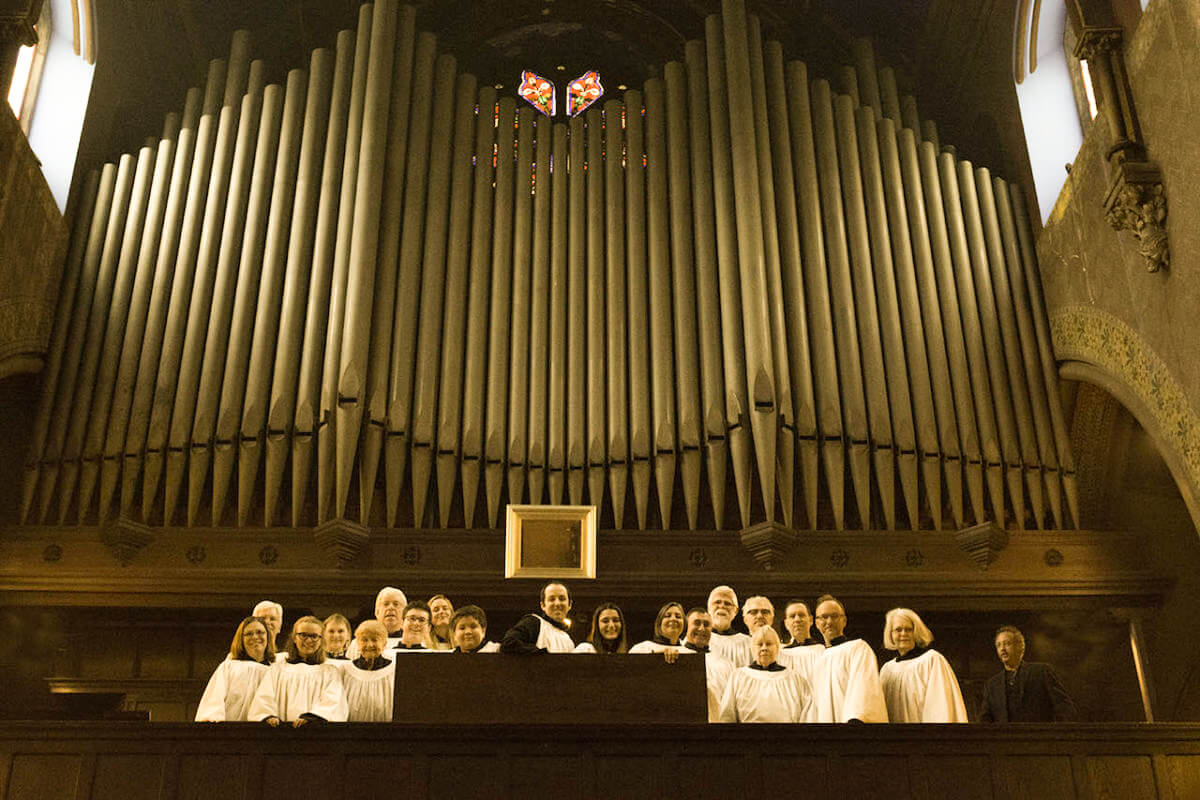Imagine not hearing the majestic sounds produced by thousands of metal or wooden organ pipes echoing around you during a wedding, funeral, or Mass. That’s the reality some houses of worship are facing as an organist shortage unfolds nationwide, on the heels of a pandemic that brought in-person services to a screeching halt for months and has since affected attendance.
As the national professional association serving the organ and choral music fields since 1896, American Guild of Organists (AGO) seeks to set and maintain high musical standards and promote understanding and appreciation of all aspects of organ and choral music. AGO recorded 14,150 members across the country in its 2019 survey—an 11% decline in membership from 2015. In 2012, the Brooklyn chapter had 58 members; today it’s 48.
Having studied organ and sacred music before being called to the priesthood, Father William L. Ogburn of Carroll Gardens’ St. Paul Episcopal Church knows firsthand the key role organ music plays in bringing parishioners closer to their faith. “Hearing a well-played organ is an amazing experience that you don’t encounter in many other places,” he said, referring to the 1914 Austin organ in the Carroll Gardens church that’ll have a new player at the helm this January.
Fr. Ogburn believes money is partly to blame for the nationwide rate of decline, citing expensive organ repairs that are easily hundreds of thousands dollars and lack of funds for organists’ salaries. “In most cases, churches can’t afford to pay a full-time organist … many organists I know have multiple jobs and gigs to make a living,” he said. “The reality is it’s becoming harder and harder to find quality organists who know the craft and are exceptional at the art.”
Bringing Bach the Time-Honored Tradition
Local organists, however, have stepped up to make sure the art doesn’t disappear. For Dr. John A. Wolfe, his path to the “king of instruments” began in church, where he loved “being enveloped by gorgeous organ music” at Christ Lutheran in Gettysburg, PA. Wolfe learned how to play at 15 from his church organist, David Erickson, and has since made it his profession.
Wolfe—who previously served as dean of the AGO Brooklyn Chapter and has been the organist at St. Philip Episcopal Church since 2019—is also one of 20 organists on the Brooklyn chapter’s substitute roster, often available to play whenever he may be needed across the borough. “Being on call is especially important for funerals, since funerals often need to be put together in just a few days,” Wolfe noted.
Though numbers are low, Wolfe has faith that the art of organ playing still has life in it yet. “Fewer Americans go to church now than in the past, so naturally there are fewer organists, [but] I hope young people in the future will still have opportunities to experience these awesome instruments,” said Wolfe. “I know enough dedicated and skilled young organists to believe our art has a bright future.
“The organ has literally a thousand years of tradition and musical literature … some of the greatest musicians in history, like J.S. Bach, Johannes Brahms and Felix Mendelssohn, all wrote for organ,” he added. “It’s humbling to feel that weight of history and to know my colleagues and I are responsible for carrying it forward. Passing these masterpieces to the next generation is definitely a critical part of a church musician’s ministry.”
St. Philip’s free Coleman Memorial Organ Recital Series—which has featured four New York City-based organists, including Wolfe, in concert so far this year—allows fans and newcomers alike to listen to professionally trained artists at work. The next installment of the series takes place on December 4 with Raymond Trapp of Plymouth Church at the bench. “The nature of music is that every listener will take something different from their listening experience, and the incredible richness of the organ’s sonic palette means there can be something for everyone,” said Wolfe.
Similarly, St. Paul’s launched a monthly evensong series to educate and evangelize. “We’ve only had a few sessions since the series began in September, but it does bring in a lot of people and it exposes them to organ music and a professional choir,” said Fr. Ogburn of the program that will run through May 2023. The next session takes place December 18. “After receiving such a positive reaction, we’re hoping to hold the series again next year.”










